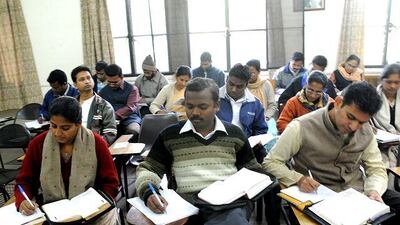NEW DELHI // Prashanto Patra, an office clerk in the eastern Indian state of Orissa, planned to send Sandeep, the youngest of his two sons, to school to study theology on his way to becoming a priest. But the 19-year-old Catholic, who graduated from high school this year, said he was not interested.
"Because my father has a very special attachment to the religion for long years, he wanted at least one of his sons to become a priest. After my elder brother became a business accountant, my father wanted me to take up priesthood as a vocation," he said. "Until four years ago, I too thought I would love to become a priest. But this vocation does not interest me that much now." Sandeep Patra, who is now studying computer technology, said that for most Indian Christians his age "theology is not an interesting subject".
"I think most young Christians of my generation do not want to involve themselves that deep into religion," he said. Christian leaders in India agree that young and educated Catholic men are showing less interest in becoming priests. "Until some years ago, brighter young men willing to join the priesthood were plenty in India. But now, for various reasons, as their preference is changing, it threatens to pose many crises for the community in the future," said Father Udumala Bala, the deputy secretary general of the Conference of Catholic Bishops of India (CCBI), based in Bangalore.
"The number of students in many seminaries has been falling recently and it points to a future crisis. But the number of brighter, intelligent and educated [in general studies] students in seminaries has seen a sharper fall, which is more worrisome," he said. "We need to set up proper infrastructure at the grass-root level and campaign for the promotion of the vocation across the country ... and we have already taken steps in this direction."
Unlike many countries in the West, India has never faced a shortage in priests, with many of them coming from large agricultural families. In the past, young men elevated their families' status in society by becoming priests. In the southern state of Kerala, known for sending thousands of priests to serve across the country, the proverb "you will earn equal dignity if you have either a priest or an elephant in the family" was once popular. But the trend is changing there and elsewhere in the country.
India's quickly modernising landscape and booming economy are encouraging an increasing number of its young men to opt for financial or material gain rather than spiritual sacrifice. "When I was a young boy, I was good in studies. Pointing at me, elderly relatives sometimes said, 'the boy looks clever, he should be a priest'. My father happily sent me to a seminary and I enthusiastically became a priest to serve the society," said Father E John Kulandai, the CCBI executive secretary. "Educated young and intelligent men are increasingly being attracted to fields such as medicine, engineering, and information technology, where they can earn more money."
Father Francis Gonsalves, the principal of Vidya Jyoti College of Theology, a Jesuit-run seminary in Delhi, said faith and a life of sacrifice had taken a back seat as materialism became the driving force of the younger generation. "The middle class consumes much more and is keen on making money at any cost now," he said. "Young men and women are told that if one is to be successful, one must make as much money as possible. Money and vocation are at odds today."
The National Vocation Service Centre seminary organised a seminar in the western city of Pune in October, focusing on the challenges facing the priesthood in India. Prelates at the seminar said more vocation promotion centres in remote areas and a stronger campaign to inspire parents and the younger generation were needed. John Dayal, the secretary of the All India Christian Council, pointed out then that the rigorous training regimen for priesthood and other church rules were not appealing to many young people.
"While evangelist priests can marry and have families, the Catholic priests have to observe celibacy. It takes a man of courage to renounce married life and parenthood," he said. "The absolute need of celibacy in the Catholic priesthood makes the vocation less attractive for at least more young people these days." Some senior church leaders believe that priesthood is now appealing more to young men who have found it difficult to find success in general life. "Previously in most cases, the best sons from the Catholic families used to be sent out to become priests, to serve the community," Father Bala said.
"Now, in most cases the best son is groomed to become a modern professional. While in many cases to serve their own interest, parents want only those sons to study theology or become priests who cannot survive the competition in life outside the church." foreign.desk@thenational.ae

